Introduction:
Pay-per-click (PPC) advertising is a competitive landscape where businesses vie for attention, clicks, and conversions. In this arena, staying ahead of your competitors is crucial for success. One powerful strategy to gain an edge is through PPC competitor analysis. By understanding what your competitors are doing, you can refine your own campaigns, discover new opportunities, and optimize your ROI. In this guide, we'll delve into the intricacies of PPC competitor analysis, providing you with actionable steps to elevate your advertising game.
Define Your Competitors:
- Before diving into analysis, identify who your main competitors are in the PPC space. These are the businesses vying for the same audience and keywords as you. Utilize tools like Google Ads Auction Insights, SEMrush, or SpyFu to compile a list of competitors actively running PPC campaigns in your niche. Let’s start the one of the best PPC competitor analysis tools SPYFU.
Spyfu:
SpyFu is a comprehensive SEO and PPC tool that provides valuable insights into competitors' advertising strategies. In its PPC Research section, SpyFu offers a range of features designed to help users analyze and optimize their PPC campaigns. Here's an exploration of some key components of the PPC Research section in SpyFu:
Overview Dashboard:
- The Overview Dashboard provides a snapshot of your domain's PPC performance, including metrics like ad spend, ad clicks, and estimated ad value. It also highlights top competitors and keywords driving traffic to your site. This overview allows you to quickly gauge your PPC performance relative to competitors and identify areas for improvement.


Top Competitors:
- SpyFu identifies your top PPC competitors based on shared keywords and provides insights into their advertising strategies. You can view metrics such as the number of keywords they're bidding on, estimated monthly clicks, and ad spend. This information helps you understand the competitive landscape and benchmark your performance against industry rivals.

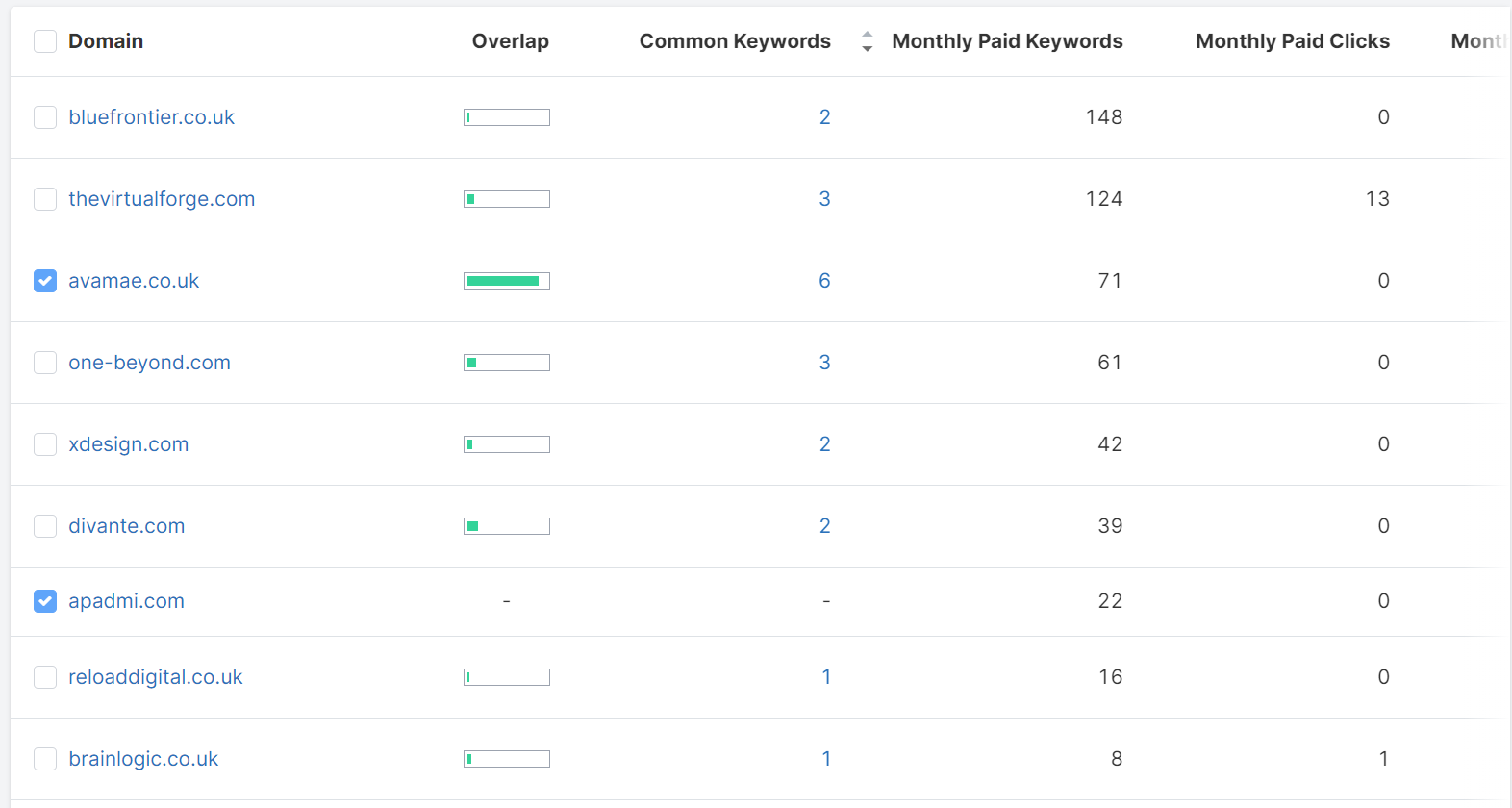


Competitor Shared Keywords:
- This feature displays keywords that you and your competitors are bidding on. You can compare your keyword portfolio with competitors to identify overlapping keywords and uncover new opportunities. SpyFu also provides metrics like keyword overlap percentage and search volume, enabling you to prioritize high-value keywords in your PPC campaigns.
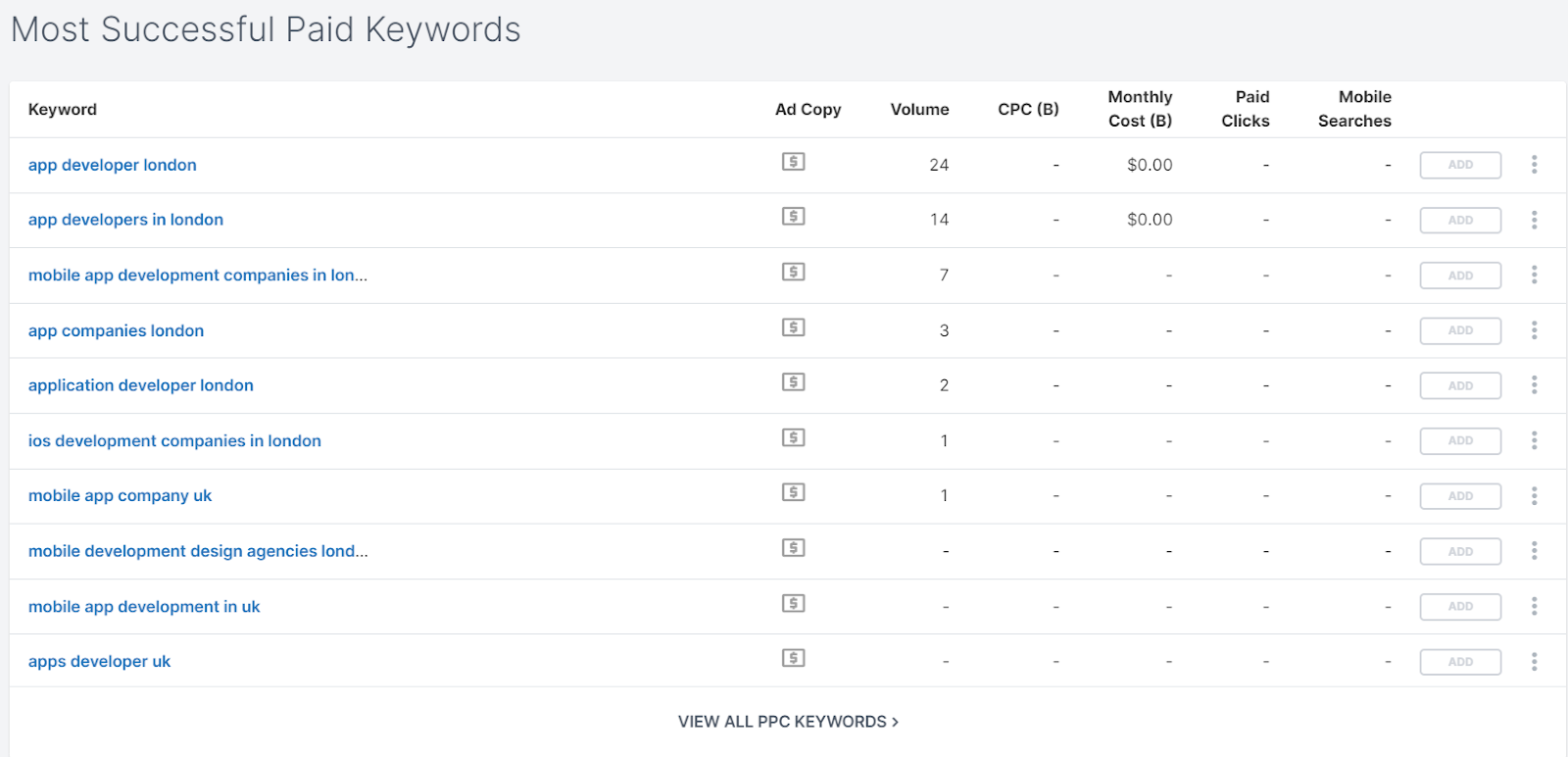
Ad History:
- SpyFu's Ads History feature allows you to view historical data on your competitors' ads, including ad copy variations, landing pages, and performance metrics. By analyzing past ad campaigns, you can identify successful messaging strategies, promotional offers, and seasonal trends. This insight helps you craft compelling ad copy and optimize your landing pages for better conversion rates.

AdWords Advisor:
- SpyFu's AdWords Advisor analyzes your Google Ads account and provides personalized recommendations to improve campaign performance. It identifies areas for optimization, such as keyword expansion, ad copy refinement, and budget allocation adjustments. By following these recommendations, you can enhance the effectiveness of your PPC campaigns and maximize ROI.

Keyword Grouping:
- Keyword Grouping allows you to organize your keyword list into themed groups for better campaign management. SpyFu automatically suggests keyword groups based on semantic relevance and search intent, streamlining the process of creating targeted ad groups. This feature helps you structure your PPC campaigns more effectively and improve ad relevance and quality score.
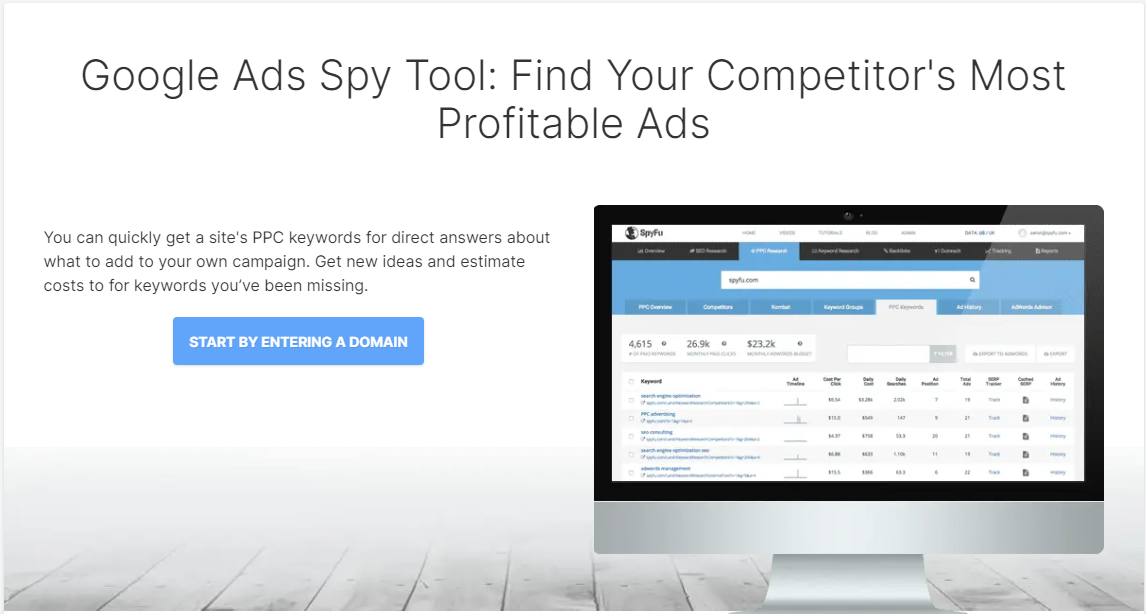

AdWords Templates:
- SpyFu offers pre-built AdWords templates tailored to specific industries and business objectives. These templates provide a starting point for creating optimized PPC campaigns, complete with keyword suggestions, ad copy templates, and budget recommendations. You can customize these templates to align with your branding and campaign goals, saving time and effort in campaign setup.

Overall, SpyFu's PPC Research section equips advertisers with powerful tools and insights to analyze competitors, optimize PPC campaigns, and achieve better results in paid search advertising. By leveraging these features, you can gain a competitive edge, improve campaign performance, and maximize ROI in the dynamic world of PPC marketing.
SEMrush:
SEMrush is another comprehensive digital marketing tool that offers a range of features for PPC (pay-per-click) research and analysis. In its PPC Research section, SEMrush provides valuable insights and data to help advertisers optimize their PPC campaigns and stay ahead of the competition. Here's an exploration of some key components of the PPC Research section in SEMrush:
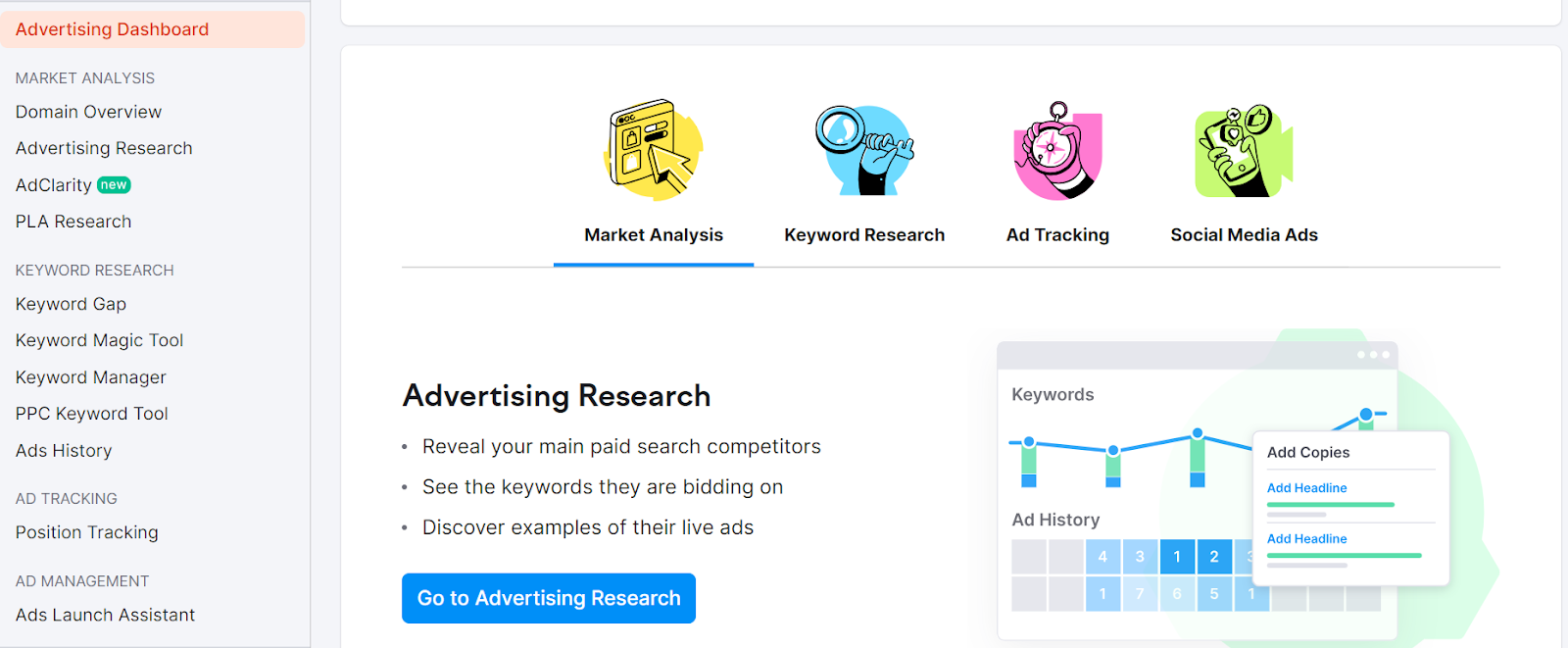

Competitors Analysis:
- SEMrush allows users to identify and analyze competitors in the PPC landscape. By entering your domain or specific keywords, you can discover competitors bidding on similar terms and targeting the same audience. SEMrush provides insights into competitors' ad copies, keywords, and landing pages, enabling you to benchmark your PPC performance and uncover new opportunities.

Advertising Research:
- SEMrush's Advertising Research feature provides detailed insights into competitors' PPC strategies. You can view information about competitors' ad campaigns, including ad copies, landing pages, ad spend, and performance metrics. This data helps you understand competitors' messaging tactics, keyword targeting, and budget allocation, allowing you to refine your own PPC strategy accordingly.

Ad Copies and Ad History:
- SEMrush allows users to explore competitors' ad copies and ad history to gain insights into their messaging strategies and promotional offers. You can analyze variations of ad copies used by competitors over time and identify trends or patterns in their advertising approach. Additionally, SEMrush provides historical data on competitors' ad performance, including click-through rates (CTR), impressions, and positions.

Keyword Research:
- SEMrush's Keyword Research tool offers a wealth of data on keywords relevant to your PPC campaigns. You can discover new keywords, assess their search volume and competition level, and identify profitable opportunities. SEMrush also provides insights into competitors' keyword strategies, allowing you to see which keywords they're bidding on and how they're performing in terms of ad positions and clicks.
Ad Builder:
- SEMrush's Ad Builder feature allows users to create and optimize ad copies for their PPC campaigns. You can generate ad copy ideas based on target keywords, competitors' ad copies, and best practices. The Ad Builder provides suggestions for headline, description, and display URL, helping you craft compelling and relevant ads that drive clicks and conversions.
PPC Campaign Monitoring:
- SEMrush enables users to monitor the performance of their PPC campaigns and track key metrics in real-time. You can monitor ad spend, clicks, impressions, CTR, and conversion rates across different ad platforms, such as Google Ads and Bing Ads. SEMrush also provides alerts and notifications to keep you informed of any significant changes or anomalies in your campaign performance.
PPC Keyword Tool:
- The PPC Keyword Tool in SEMrush allows users to research and analyze keywords specifically for PPC campaigns. You can explore keyword variations, assess their cost-per-click (CPC) estimates, and identify negative keywords to exclude from your campaigns. SEMrush provides insights into keyword trends, search volume fluctuations, and competitor bidding patterns to help you make informed decisions in keyword selection and optimization.
Overall, SEMrush's PPC Research section offers a comprehensive suite of tools and features to analyze competitors, research keywords, optimize ad copies, and monitor PPC campaign performance. By leveraging these insights and data, advertisers can enhance their PPC strategies, improve campaign effectiveness, and achieve better results in paid search advertising.
Best Tools for PPC Competitor Research
After exploring the PPC research sections of both SpyFu and SEMrush, it's evident that both tools offer robust features and valuable insights for advertisers looking to optimize their PPC campaigns and stay ahead of the competition. Here's a comparison conclusion highlighting the key strengths of each platform:
SpyFu PPC Competitor Research:
- SpyFu excels in providing in-depth competitor analysis, offering comprehensive data on competitors' PPC strategies, ad copies, keywords, and performance metrics.
- The platform's Ad History feature allows users to explore historical data on competitors' ad campaigns, providing insights into past messaging strategies, promotional offers, and trends.
- SpyFu's emphasis on identifying top competitors and analyzing shared keywords helps advertisers benchmark their performance and uncover new opportunities for optimization.
- The tool's AdWords Advisor offers personalized recommendations to improve campaign performance, guiding users on keyword expansion, ad copy refinement, and budget allocation.
SEMrush PPC Competitor Research:
- SEMrush offers a wide range of features for PPC research, including competitor analysis, ad research, keyword research, and campaign monitoring.
- The platform's Advertising Research feature provides detailed insights into competitors' ad campaigns, ad copies, landing pages, ad spend, and performance metrics.
- SEMrush's Keyword Research tool offers comprehensive data on keywords relevant to PPC campaigns, including search volume, competition level, and profitability.
- The Ad Builder feature in SEMrush allows users to create and optimize ad copies based on target keywords, competitors' ad copies, and best practices.
In conclusion, both SpyFu and SEMrush are powerful tools for PPC research, each offering unique features and capabilities to help advertisers enhance their PPC strategies and achieve better results in paid search advertising. Depending on specific needs and preferences, advertisers may choose one platform over the other or even use both in combination for a comprehensive PPC research and optimization toolkit.
Pricing
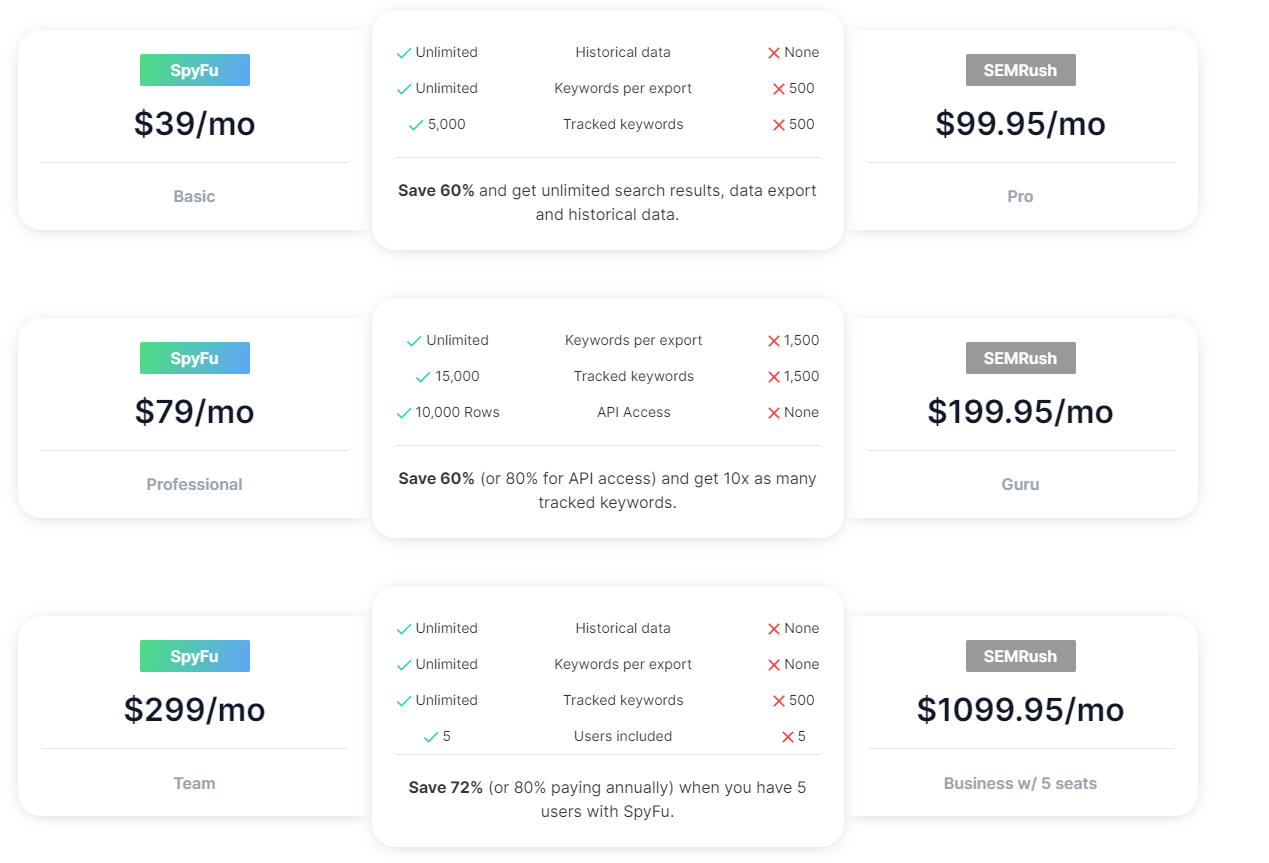
Now Let’s move forward with Best Way for PPC Competitor Analysis
Analyze Ad Copy and Messaging:
- Study your competitors' ad copies across different platforms. Pay attention to the tone, language, offers, and unique selling propositions (USPs) they use. Analyze the keywords they're targeting and how they incorporate them into their ad text. Look for patterns or strategies that resonate with your target audience.
Assess Keyword Strategy:
- Keywords are the backbone of any PPC campaign. Analyze the keywords your competitors are bidding on. Identify high-performing keywords they're targeting and see if there are any gaps or opportunities they might be overlooking. Tools like Keyword Spy and SEMrush can provide insights into your competitors' keyword strategies.
Evaluate Ad Extensions and Formats:
- Utilizing ad extensions can amplify the visibility and impact of your advertisements. Analyze which ad extensions your competitors are using and how they're leveraging them. Evaluate whether they're utilizing site links, callouts, structured snippets, or other extensions to attract clicks and improve ad relevance. Also, take note of any emerging ad formats they're experimenting with, such as responsive search ads or video ads.

Examine Landing Pages:
- A compelling landing page is essential for converting clicks into leads or sales. Analyze the landing pages your competitors are driving traffic to from their ads. Assess the messaging, design, call-to-action (CTA), and overall user experience. Identify elements that resonate with your target audience and consider how you can improve upon them in your own landing pages.
Monitor Bidding Strategies and Budget Allocation:
- Gain insights into your competitors' bidding strategies and budget allocation. Tools like Auction Insights in Google Ads or competitive intelligence platforms can provide visibility into your competitors' impression share, average position, and overlap rate. Analyze their bidding patterns and determine how aggressive or conservative they are in their approach.
Track Performance Metrics:
- Track key performance metrics for your competitors' PPC campaigns, such as click-through rate (CTR), conversion rate, cost per click (CPC), and return on ad spend (ROAS). Compare these metrics to your own campaign performance to identify areas where you can improve. Additionally, monitor any fluctuations or trends in your competitors' performance over time.
Stay Updated and Iterate:
- PPC advertising is dynamic, with trends, strategies, and competitors constantly evolving. Stay updated on industry changes, new features, and emerging competitors. Continuously iterate and refine your PPC campaigns based on your competitor analysis insights and performance data.
Conclusion:
PPC competitor analysis is a powerful practice for optimizing your advertising efforts and gaining a competitive edge in the digital landscape. By dissecting your competitors' strategies, you can uncover valuable insights, identify opportunities, and refine your own campaigns for maximum impact. Incorporate the steps outlined in this guide into your PPC strategy to stay ahead of the curve and achieve your advertising goals.

.png)




